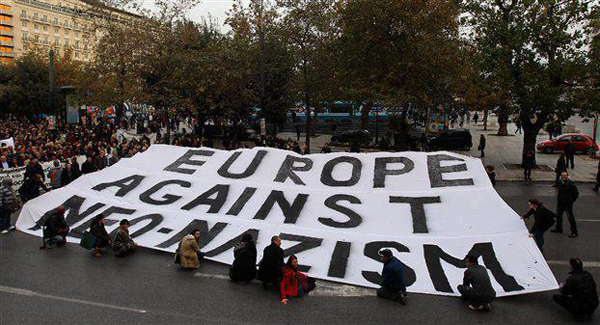No, if it is considered personal view of every one.
«I leave peace with you, my peace I give you: I do not give to you as the world gives. Let your hearts not be troubled and do not be afraid “(John 14:27). These words of the Bible are the answers to those who blame Christians saying.
-“If your God has brought peace, then why are wars going on around the world?”
The point is that no God and no faith “does guarantee” that the world and we will be doing well, the faith “does not quiets” the world, at least our Christian religion shows us the way to get inner and spiritual peace. But the inside and outside are interrelated, it is also evident.
“Eternal peace” as a political term has emerged in the 17th century, but until then, wars have killed millions of people, destroyed thousands of cities, destroyed states and the brightest minds naturally wondered how to get sustainable peace in the world. The “world”, however, is understood in different ways. For example, Plato and Aristotle believed that Hellas’s all cities and states must live in peace, but for the normal functioning of these “policies” slaves were necessary. And where would “raise” the slaves? Of course, by means of making wars with the Greek. So, as long as there are slaves, taking both literally and figurative meaning of my wards, rather, as long as there is a need to build the country’s domestic life through them, we shall have wars.
The representatives of Buddhism talk about peace before Greeks before. “Ahimsa” is a behavior which is aimed at reducing the evils of the world, it’s a battle against the evil and not its owners, the principle is to harm anyone neither by mind, nor by word. Indian king Ashok taking Buddhism in the 3rd century BC said that “Ahimsa” was a national merit. The king was planning to conquer the world, not with arms, but with love. These are wonderful principles. Using them, it is possible to achieve great success in the family, workplace, and professional framework. But it fails to propagate peace in the country and in the world.
The term “eternal peace” began to be discussed in the 17th century purely out of political and diplomatic reasons. French King Henry IV offered his minister Maximilian Sullen to divide Europe into 15 approximately equal countries. The internal issues were to be settled by the Council of the Union, which should to be composed of 60 members (4 representatives from each country), which would prevent wars.
Of course, it is easy to frustrate the plan as utopian, which did numerous authors, including Jean-Jacques Rousseau, who showed that totalitarian states is not interested in peace policy. But in the second half of the 20th century, it became clear that United States policy is not meant to be democratic peace. External conditions thus are few. That is why the Europeans writers; Erasmus, Kaminski, William Penny, Kant, Fichte, Herder noted that “eternal peace” must be only political and economic, but also moral and spiritual. Kant, for example, understood that it was naive to think that peace can be achieved by any diplomatic documents. But it is a goal toward which we should daily focus our efforts. As Buddhists and Christians prove, the changes are due to internal reforms.
… “Perpetual Peace” has also a narrow historical background. It is a contract that was signed in 1686 between Russia and Rech Pospolita. The agreement s approved until then signed all items concerning the ceasefire, except for one point, according to which Kiev should be “forever” recognized the part of Russia: 146 thousand rubles in compensation. That peace document, as you can see, did not last “forever”.
Aram ABRAHAMYAN



















































